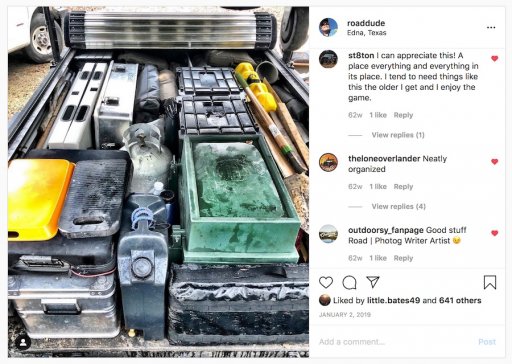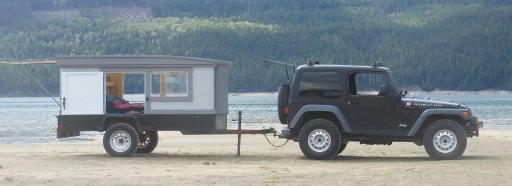.
That's a very open ended question, as SO much of what folks consider the "top most needed things" for an adventure trailer depends on what type of adventures they plan on undertaking the most often.
Where, how long, how far off-pavement, how experienced you are with adventuring and camping, etc. A lot of what I might consider "most needed" may be far different than yours or anyone else's.
That said,
@MOAK made some good points about making your tow vehicle the primary power source in certain situations. Right now, my trailer is my main basecamp power source (120w full time but portable solar with 100ah quality deep cycle batts to store the energy), and I'm replicating it in my van to have redundant and interchangeable system and parts.
I like to have water storage in my trailer, and have a built-in 22gal underbody, over-the-axle, armored, tank (with a baffle so it does not all slosh to one side or the other when off camber). Having it under body but over axle keeps my center of gravity low when the tank is full, too.
Because I like to go way off-grid for long periods of time, like weeks and months, and enjoy extended base camp setups where I may leave my trailer set up for weeks at a time, I do like having separate and self-sufficient power in my trailer, though, to supply the water pump, simple 12v outlets and power the inverter in my nosebox for charging 110 items like my camera batts and ebike battery. It also allows me to leave stuff charging, or leave others in camp with power and water, while out in my van and away from camp.
Like
@Billiebob said too, approach and departure angles can be critical in a good off-road trailer, along with your hitch height. No fun to be hung up in a deep desert arroyo or woods gully because you have not thought about your bumper, hitch, or forward gear getting hung up.
And, as Bill said and should be 2nd nature if you get out a lot; organization. Make it easy on yourself; pack so you can unpack easily and pack back up in smart ways. Everything will eventually have its right place to be.
I like an open cargo bed in which I can organize things the way I want for any particular adventure, and not be stuck to stuffing stuff in smaller compartments like so many off-road trailers have. It's easily one of the best features of my trailer. I like having an easily-sealed cargo bay area (as large as a long bed pickup), with a raise-able rack and RTT above, water tank below, good side boards and fenders, and a very nicely-sized nosebox up front with power center and tons more storage.
I employ a lane system for packing my trailer because I can easily get to both sides and the rear, even when my awning and RTT are deployed. I pretty much always load with the most necessary and most used things to the rear, though in three lanes, front to back. At the tailgate is my chuck box, bag with lines and stakes, recovery gear, whatever I think I will need most along the way and out first next stop. The lane system then also allows me to access other gear like awning poles, shovel, etc from the sides when needed while camped without pulling out a mess of other stuff to access what I want.

.
Actually, the main thing Tyler,
@Argleben34, is to NOT pre-think what you need too much before you get out there a bunch of times, but take your trailer out barebones and packed however it happens several times, and see what YOUR particular needs are in regards to how YOU set up your trailer, and what you need more of next time or can leave behind.
Let it evolve and not be restricted to what you
thought it should be before using it much.
*** If you're paying attention and listen to your gear, it will tell you where it wants to live and what you need to make life easier on the road. ***
.









